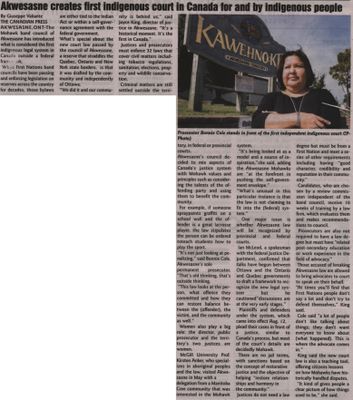"Akwesasne creates first indigenous court in Canada for and by indigenous people"
- Publication
- Turtle Island News, 12 Oct 2016
- Full Text
- Akwesasne creates first indigenous court in Canada for and by indigenous peopleBy Giuseppe Valiante, THE CANADIAN PRESS, AKWESASNE, ONT - The Mohawk band council of Akwesasne has introduced what is considered the first indigenous legal system in Canada outside a federal framework.
While First Nations band councils have been passing and enforcing legislation on reserves across the country for decades, those bylaws are either tied to the Indian Act or within a self-governance agreement with the federal government.
What's special about the new court law passed by the council of Akwesasne, a reserve that straddles the Quebec, Ontario and New York state borders, is that it was drafted by the community and independently of Ottawa.
"We did it and our community is behind us," said Joyce King, director of justice in Akwesasne. "It's a historical moment. It's the first in Canada."
Justices and prosecutors must enforce 32 laws that cover civil matters including tobacco regulations, sanitation, elections, property and wildlife conservation.
Criminal matters are still settled outside the territory, in federal or provincial courts.
Akwesasne's council decided to mix aspects of Canada's justice system with Mohawk values and principles such as considering the talents of the offending party and using them to benefit the community.
For example, if someone spraypaints graffiti on a school wall and the offender is a great lacrosse player, the law stipulates the person can be ordered toteach students how to play the sport.
"It's not just looking at penalizing," said Bonnie Cole, Akwesasne's sole permanent prosecutor. "That's the old thinking, that's outside thinking.
"This law looks at the person, what offence they committed and how they can restore balance between the (offender), the victim, and the community as well."
Women also play a big role: the director, public prosecutor and the territory's two justices are women.
McGill University Prof. Kirsten Anker, who specializes in aboriginal peoples and the law, visited Akwesasne in May with a delegation from a Manitoba Cree community that was interested in the Mohawk system.
"It's being looked at as a model and a source of inspiration," she said, adding the Akwesasne Mohawks are "at the forefront in pushing the self-government envelope."
"What's unusual in this particular instance is that the law is not claiming to fit into the (federal) system."
One major issue is whether Akwesasne law will be recognized by provincial and federal courts.
Ian McLeod, a spokesman with the federal justice Department, confirmed that talks have begun between Ottawa and the Ontario and Quebec governments to draft a framework to recognize the new legal system but he cautioned "discussions are at the very early stages."
Plaintiffs and defenders under the system, which came into effect Aug. 12, plead their cases in front of a justice, similar to Canada's process, but most of the court's details are decidedly Mohawk.
There are no jail terms, with sanctions based on the concept of restorative justice and the objective of helping "restore relationships and harmony in the community."
Justices do not need a law degree but must be from a First Nation and meet a series of other requirements including having "good character, credibility and reputation in their community."
Candidates, who are chosen by a review commission independent of the band council, receive 10 weeks of training by a law firm, which evaluates them and makes recommendations to council.
Prosecutors are also not required to have a law degree but must have "related post-secondary education or work experience in the field of advocacy."
Those accused of breaking Akwesasne law are allowed to bring advocates to court to speak on their behalf.
"At times you'll find that First nations people don't say a lot and don't try to defend themselves," King said.
Cole said "a lot of people don't like talking about things; they don't want everyone to know about (what happened). This is where the advocate comes in."
King said the new court law is also a teaching tool, offering citizens lessons on how Mohawks have historically handled disputes.
"It kind of gives people a clear picture of how things used to be," she said.
- Creator
- Valiante, Giuseppe, Author
- Media Type
- Text
- Newspaper
- Item Type
- Clippings
- Description
- "AKWESASNE, ONT - The Mohawk band council of Akwesasne has introduced what is considered the first indigenous legal system in Canada outside a federal framework."
- Publisher
- Turtle Island News
- Place of Publication
- Six Nations of the Grand River, ON
- Date of Publication
- 12 Oct 2016
- Subject(s)
- Personal Name(s)
- King, Joyce ; Cole, Bonnie ; McLeod, Ian ; Anker, Kirsten
- Corporate Name(s)
- Mohawk Council of Akwesasne ; McGill University
- Local identifier
- SNPL007313v00d
- Language of Item
- English
- Geographic Coverage
-
-
Ontario, Canada
Latitude: 45.05009 Longitude: -74.56597
-
- Creative Commons licence
 [more details]
[more details]- Copyright Statement
- Public domain: Copyright has expired according to Canadian law. No restrictions on use.
- Copyright Date
- 2016
- Copyright Holder
- Turtle Island News
- Contact
- Six Nations Public LibraryEmail:info@snpl.ca
Website:
Agency street/mail address:1679 Chiefswood Rd
PO Box 149
Ohsweken, ON N0A 1M0
519-445-2954



